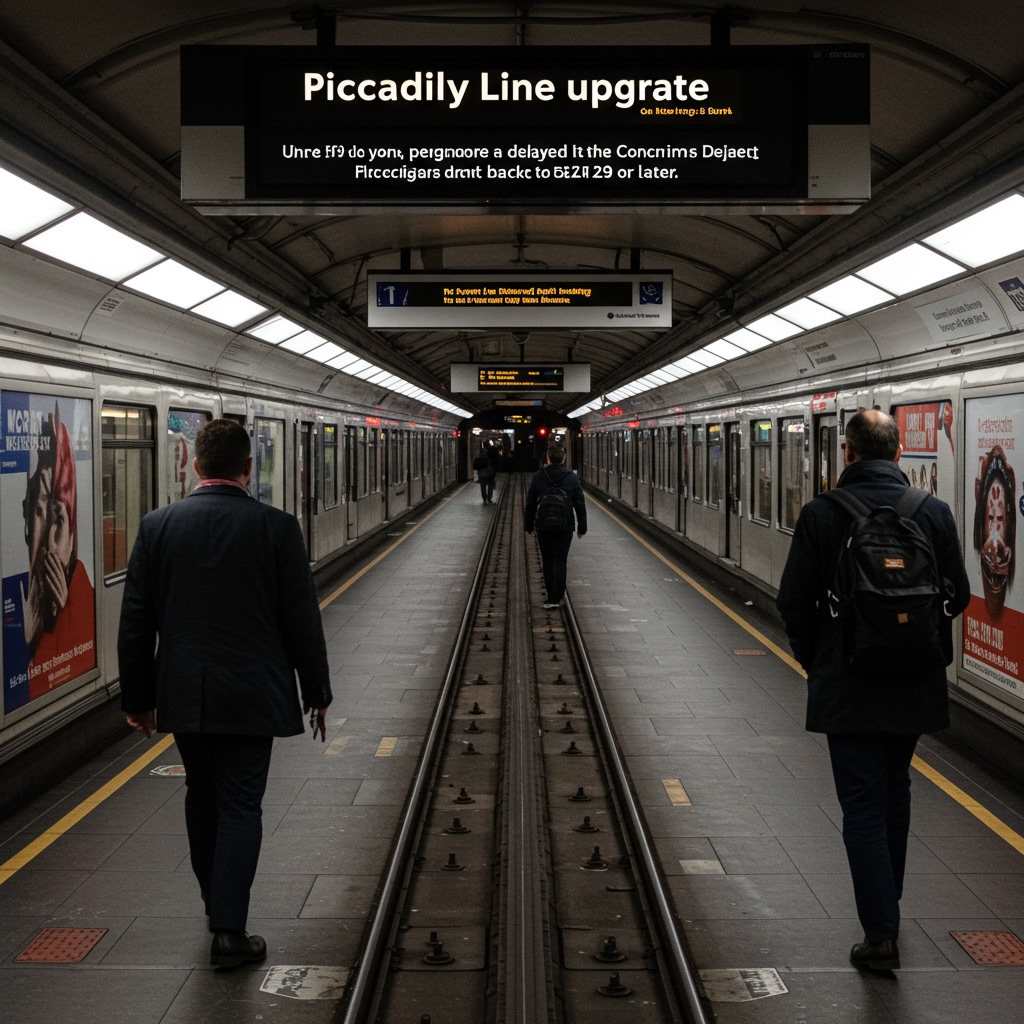Piccadilly Line Upgrade Faces Significant Delays, TfL Confirms
Transport for London (TfL) has announced a substantial delay to the crucial £1.5 billion upgrade project intended to modernise the Piccadilly Line. Originally slated for completion by 2027, the comprehensive overhaul, which includes the introduction of a brand-new fleet of trains, is now anticipated to finish in 2029 or later. This setback represents a significant challenge for TfL and London commuters alike, impacting plans for increased capacity and improved passenger experience on one of the Capital’s busiest underground lines.
The Piccadilly Line Upgrade is one of the most significant investments TfL is undertaking, valued at £1.5 billion. Its core components include designing, manufacturing, and commissioning a new fleet of trains, procuring new signalling systems, and undertaking necessary infrastructure works across the line. The new trains, built by Siemens Mobility in Goole, East Riding of Yorkshire, are a key element, promising walk-through carriages, air conditioning, and enhanced accessibility features, along with increased reliability. These modern trains are designed to operate more frequently, enabling a planned boost in capacity – a critical need given the Piccadilly Line’s high passenger volumes, particularly during peak hours and serving key locations like Heathrow Airport and Central London.
Causes Behind the Delay
TfL attributes the primary reasons for the delay to a confluence of factors, notably supply chain disruptions and unforeseen engineering complexities. The global supply chain issues, exacerbated by various geopolitical and economic events, have impacted the timely delivery of critical components required for both the new rolling stock and the associated infrastructure upgrades. This has created bottlenecks in the manufacturing and assembly process for the new trains and delayed the progress of trackside and signalling works.
Furthermore, TfL reported encountering unforeseen engineering complexities during detailed planning and preparatory work for certain sections of the line. While the specific nature of these complexities has not been fully detailed, it is understood that working within the constraints of a historic, operational railway infrastructure presents inherent challenges. Navigating the subterranean environment, particularly near sensitive or complex areas, requires meticulous planning and often reveals conditions not fully apparent until work commences. Sources indicate that significant challenges have arisen during the preparatory phases for infrastructure enhancements needed to support the new trains and signalling, particularly in complex areas of the network.
One area specifically referenced in connection with these complexities is the infrastructure required near the Cockfosters depot and the northern end of the line. This section is vital for stabling, maintaining, and launching the train fleet, and unexpected issues during the assessment or initial works in this vicinity have contributed to the revised timeline. The interplay between manufacturing delays for the new trains and the slower-than-anticipated progress on civil and engineering works means that the integrated testing and commissioning phases, which require both the new trains and the upgraded infrastructure to be ready simultaneously, have been significantly pushed back.
Impacts and Future Assessment
The delay to the Piccadilly Line Upgrade has several immediate and longer-term consequences. The most direct impact is on the planned rollout of the new rolling stock. The new trains were expected to progressively enter service from 2025, allowing TfL to begin phasing out the ageing 1973 stock. With the project completion now anticipated in 2029 or later, Londoners will have to wait longer to experience the benefits of the modern fleet. This also means the network will continue to rely on the older trains, which are more prone to faults and require intensive maintenance, potentially affecting reliability and passenger experience in the interim.
Crucially, the delay also directly impacts the planned capacity increases on the line. The upgrade was designed to allow for a significant uplift in train frequency during peak hours, addressing growing demand. Pushing back the completion date means that the Piccadilly Line will operate at its current capacity for a longer period, potentially leading to increased overcrowding as passenger numbers recover and grow. TfL had modelled the capacity increase as essential for future demand, and this postponement necessitates a reassessment of those projections and mitigation strategies.
TfL is currently undertaking a thorough assessment of the full financial and operational implications of the delay. While the initial project budget was £1.5 billion, delays in large-scale infrastructure projects often lead to cost increases due to extended contractor involvement, inflation, and managing unforeseen issues. TfL will need to evaluate the financial impact of the extended timeline and potentially revise the overall project budget. Operationally, they must determine how to best manage the existing fleet, maintain service reliability with older trains for an extended period, and manage passenger expectations regarding crowding and the introduction of new services.
Next Steps and Revised Timelines
TfL has confirmed it is working closely with its key contractors and stakeholders, including Siemens Mobility, to develop firm revised timelines for the project milestones. While the overall completion is now forecast for 2029 or later, a detailed schedule outlining when specific activities, such as the start of new train testing or infrastructure commissioning, will occur is being finalised. The organisation has stated its commitment to completing the upgrade, recognising its importance for London’s transport infrastructure and future growth.
Passengers are advised that while the major benefits of the full upgrade, like the complete fleet replacement and increased frequency, are now further in the future, TfL continues to undertake essential maintenance and minor improvements on the Piccadilly Line to ensure safety and reliability in the interim. Updates on the revised project schedule and its impacts are expected to be communicated by TfL as their assessment and planning are completed. The delay underscores the complexities inherent in modernising a vital, high-intensity metropolitan railway network built over many decades.





